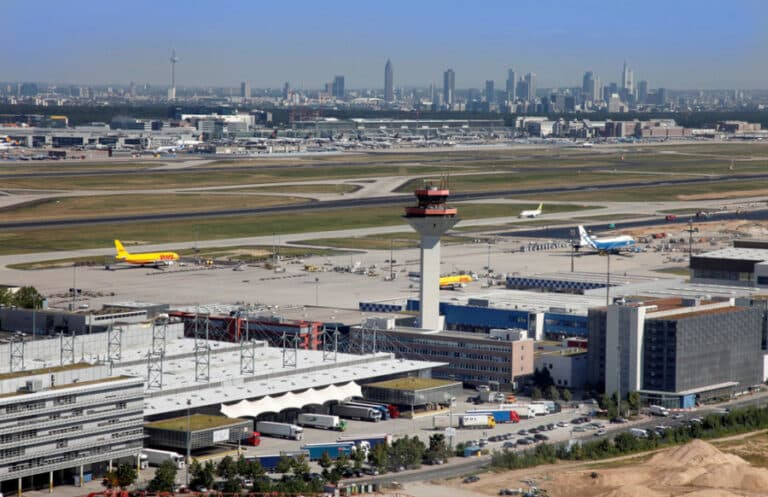Germany’s main cargo hub Frankfurt Airport is in seemingly continuous expansion phase, writes Neil Madden.
Cargo throughput (including airmail) rose by just 0.7 per cent to 539,610 tonnes in the first quarter of this year, in line with a warning given by owner Fraport Group of slower growth in cargo. This was attributed to a combination of factors, including the strong euro, later than usual Chinese New Year and early Easter holidays.
However, the airport is not standing still. In March, China Cargo Airlines became the latest cargo carrier to offer a regular service from Frankfurt.
China Cargo is operating a new service between Shanghai-Pudong and Frankfurt twice a week on Wednesdays and Sundays, and the carrier intends to increase the frequency after obtaining additional traffic rights.
Investing in infrastructure remains critical to Frankfurt’s future success. The airport’s CargoCity South has grown into an internationally recognised template for the development of a successful logistics hub. More than 200 companies now have a presence on the site’s 98 hectares.
With over 300 flight connections worldwide, the Frankfurt hub enjoys the added advantages of being connected to one of Europe’s most important motorway junctions, the Frankfurter Kreuz, as well as a first-class rail network.
In April, Swissport and Fraport sign long-term lease agreement for a new cargo warehouse at the airport.
At some 16,000 square metres the new facility will be the third largest in Swissport’s global network. Construction is due to start in 2019, with the facility handed over to Swissport in 2020.
“Infrastructure plays a key role in optimising our service delivery and reaching the ambitious efficiency and reliability goals for our clients around the world,” said Swissport Germany, Austria & Switzerland senior vice president Willy Ruf, explaining why the ground handler had committed millions of euros to the project.
Following this announcement, Fraport AG also received the CEIV Pharma certification from IATA for ramp handling of pharmaceuticals. This makes Frankfurt the largest airport in the world to have received this certification for the entire handling chain of pharmaceutical products.
Fraport senior executive vice president of ground services Martin Bien commented: “We see pharmaceutical transportation as a growth market for the future. Receiving the CEIV certification underscores that Fraport has the requisite infrastructure and the necessary expertise to accommodate this growth.”
More than 100,000 tonnes of vaccines, drugs, medicines and other pharmaceutical products were handled at Frankfurt in 2017.
Fraport’s ramp handling division has been operating a transporter vehicle for temperature-controlled shipments for over 20 years. Now, it is the first ground equipment in the world to be covered by the CEIV certification.
The special vehicle allows transport of main and lower-deck units in a temperature range from -30 to +30C with pinpoint precision. Moreover, the transporter is equipped with an electronic temperature monitoring system and tracking options.
And as technology is set to play an increasing role in cargo handling, Fraport is part of group looking to exploit an innovative ground handling system.
Fraport is co-operating with local logistics software start-up CargoSteps, RheinMain University of Applied Sciences, the Fraunhofer Institute, autonomous vehicles manufacturer KAMAG, warehouse logistics specialist LUG and forwarders Sovereign and Dachser in the ‘Smart Air Cargo Trailer (SAT)’ project, which received a grant from state investment agency HessenAgentur.
The goal of SAT is to automate short-haul transport between cargo handlers and freight forwarders with the help of a cloud-based platform and to replace this with (semi-) autonomous transport.
Ultimately, the project should lead to ‘needs-based transport’ carried out when required by the sender or recipient.
SAT could practically eliminate waiting times by carrying out each transport move on demand. In addition, it should speed up the transfer process between handlers and forwarders as well as significantly reducing error rates.
A further benefit is greater utilisation of vehicles and hence fewer transport moves for a given volume of cargo. This would cut CO2 emissions related to standing and waiting times.



